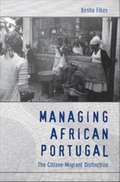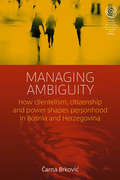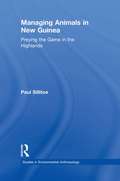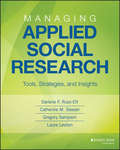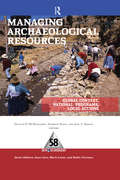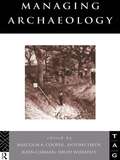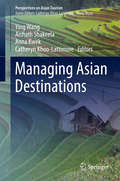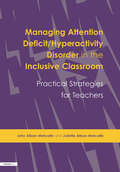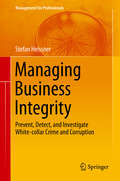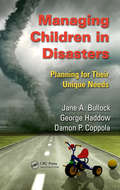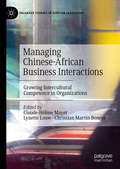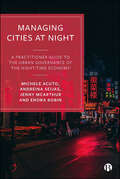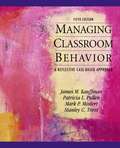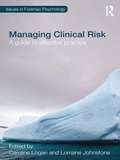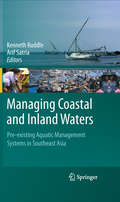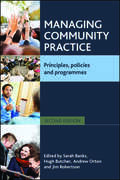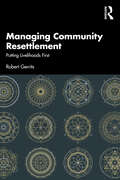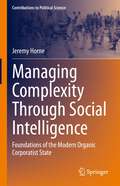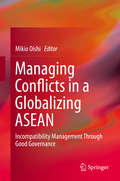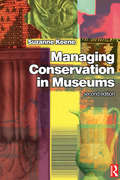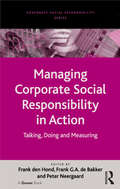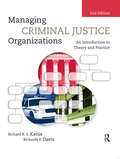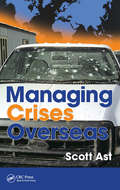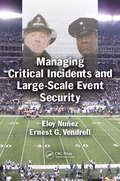- Table View
- List View
Managing African Portugal: The Citizen-Migrant Distinction
by Kesha FikesIn Managing African Portugal, Kesha Fikes shows how the final integration of Portugal's economic institutions into the European Union (EU) in the late 1990s changed everyday encounters between African migrants and Portuguese citizens. This economic transition is examined through transformations in ideologies of difference enacted in workspaces in Lisbon between the mid-1990s and the early 2000s. Fikes evaluates shifts in racial discourse and considers how both antiracism and racism instantiate proof of Portugal's European "conversion" and modernization. The ethnographic focus is a former undocumented fish market that at one time employed both Portuguese and Cape Verdean women. Both groups eventually sought work in low-wage professions as maids, nannies, and restaurant-kitchen help. The visibility of poor Portuguese women as domestics was thought to undermine the appearance of Portuguese modernity; by contrast, the association of poor African women with domestic work confirmed it. Fikes argues that we can better understand how Portugal interpreted its economic absorption into the EU by attending to the different directions in which working-poor Portuguese and Cape Verdean women were routed in the mid-1990s and by observing the character of the new work relationships that developed among them. In Managing African Portugal, Fikes pushes for a study of migrant phenomena that considers not only how the enactment of citizenship by the citizen manages the migrant, but also how citizens are simultaneously governed through their uptake and assumption of new EU citizen roles.
Managing Aggression
by Ray BraithwaiteHow to manage and respond to escalating violence towards staff working in the human services is a pressing professional problem. This workbook: empowers individuals by providing a range of useful useful skills that can help in managing aggression enables staff placed in difficult or dangerous situations by their employers to address the issue effectively clarifies the responsibilities of the manager in ensuring staff are safeguarded builds confidence in staff and their managers by offering workable solutions to reducing levels of aggression in the workplace. Highlighting examples of good and bad practice, Managing Aggression is a book for anyone who has ever faced, or is likely to face, aggression at work.
Managing Ambiguity: How Clientelism, Citizenship, and Power Shape Personhood in Bosnia and Herzegovina (EASA Series #31)
by Čarna BrkovićWhy do people turn to personal connections to get things done? Exploring the role of favors in social welfare systems in postwar, postsocialist Bosnia and Herzegovina, this volume provides a new theoretical angle on links between ambiguity and power. It demonstrates that favors were not an instrumental tactic of survival, nor a way to reproduce oneself as a moral person. Instead, favors enabled the insertion of personal compassion into the heart of the organization of welfare. Managing Ambiguity follows how neoliberal insistence on local community, flexibility, and self-responsibility was translated into clientelist modes of relating and back, and how this fostered a specific mode of power.
Managing Animals in New Guinea: Preying the Game in the Highlands (Studies in Environmental Anthropology)
by Paul SillitoeManaging Animals in New Guinea analyzes the place of animals in the lives of New Guinea Highlanders. Looking at issues of zoological classification, hunting of wild animals and management of domesticated ones, notably pigs, it asks how natural parameters affect people's livelihood strategies and their relations with animals and the wider environment.
Managing Applied Social Research: Tools, Strategies, and Insights
by Darlene F. Russ-Eft Catherine M. Sleezer Gregory Sampson Gruener Laura C. LevitonEssential management guidance for real-world applied research projects Managing Applied Social Research equips you with the skills, strategies, and knowledge you need to effectively manage research projects. Written by a team of nationally-known researchers, this book covers the systematic management of applied social research studies from 'soup to nuts,' providing researchers with an easy-to-follow process and the tools and templates for improving the quality, ethical conduct, and usefulness of the final products. The authors merge expertise adapted from the field of project management with their decades of experience in using established research methodologies and practices to offer readers; practical examples and insights gleaned from major research houses such as Rand, Urban Institute, Mathematica, American Institutes for Research, and others. Key concepts and methodologies are systematically unpacked, with detailed discussion of both theoretical bases and practical applications in the field. Written in plain English, the case studies and vignettes illustrate typical approaches to different scenarios, and the checklists, templates, and other tools provide guides for action. Starting from basic social research strategies, you'll build an understanding of applied research issues and how projects are best managed in a messy, imperfect world. From conceptualization and proposal through implementation, analysis, and reporting, this book helps you lead your projects to success. Learn the skills and concepts necessary to effectively manage applied research projects for the social science disciplines Anticipate and prepare for common challenges and obstacles Understand the various roles and their requisite tasks and responsibilities Learn strategies for making effective decisions about a study's scope, work, schedule, people, budget, and risks during each phase of the research study Social science research is an essential well of information upon which society is run. Proper management is the key to any research project's success, and success becomes more critical in the field given the potential ramifications in terms of policy and its effects on real, everyday people. Managing Applied Social Research provides sound guidance and expert insight with an essential real-world focus.
Managing Archaeological Resources: Global Context, National Programs, Local Actions (One World Archaeology Ser. #58)
by Francis P. McManamon Andrew Stout Jodi A. BarnesIn a snapshot of 21st century archaeological resource management as a global enterprise, these 25 contributors show the range of activities, issues, and solutions undertaken by contemporary managers of heritage sites around the world. They show how the linkages between global archaeology and funding organizations, national policies, practices, and ideologies, and local populations and their cultural and economic interests foster complexity of the issues at all levels. Case materials from five continents introduce common themes of archaeologist relations with descendant groups, public outreach, national/local relationships, and data and site preservation. Sponsored by the World Archaeological Congress.
Managing Archaeology: A Theoretical, Historical And Comparative Perspective On Society And Its Submerged Past (Theoretical Archaeology Group Ser.)
by John Carman David Wheatley Malcolm A. Cooper Antony FirthEffective management is becoming increasingly important in all aspects of archaeology. Archaeologists must manage the artefacts thay deal with, their funding, ancient sites, as well as the practice of archaeology itself. Managing Archaeology is a collecton of outstanding papers from experts involved in these many areas. The contributors focus on the principles and practice of management in the 1990s, covering such crucial aeas as the management of contract and field archaeology, heritage management, marketing, law and information technology. The resulting volume is important and informative reading for archaeologists and heritage managers, as well as planners, policy makers and environmental consultants.
Managing Asian Destinations (Perspectives On Asian Tourism)
by Catheryn Khoo-Lattimore Ying Wang Aishath Shakeela Anna KwekThis book focuses on the planning, marketing, and management of Asian tourism destinations, and evaluates current developments within Southeast-Asia and the wider Asia-Pacific region. As more Asian destinations enter the global tourism arena and more Asian travellers look to explore destinations in Asia and beyond, an understanding of how Asian destinations practice tourism is crucial to the future sustainable development of global tourism. This book provides an invaluable stock of research and knowledge based on the Asian practice and experience in destination planning, marketing, and management, offering insights into the latest development and trends in the region.
Managing Attention Deficit/Hyperactivity Disorder in the Inclusive Classroom: Practical Strategies
by John Alban-Metcalfe Juliette Alban-MetcalfeThis book provides commonsense information and insights into the condition, and considers the: · key features of AD/HD and which warning signs to watch out for · educational implications for children diagnosed · pros and cons of using medication · case studies which demonstrate the successful and effective inclusion of children with AD/HD into mainstream classrooms · ways in which parents, teachers and schools can co-operate with other agencies to ensure best provision for the child The authors also provide guidance on writing Individual Education Plans, clear explanations of the statementing process and a discussion on the implications of whole school planning and multi-agency working.
Managing Business Integrity
by Stefan HeissnerThis book deals with the highly complex but exciting subject of corporate fraud and corruption, which has since become the cops and robbers game of the 21st century: accounting fraud, embezzlement, bribery and many other forms of corruption and non-compliance cause turmoil between board members, supervisory board members and managers, while economic crime and corruption cause damages amounting to billions every year. When cases of misconduct and non-compliance become public knowledge, additional loss of reputation is the result, the consequences of which aren't even quantifiable for the companies concerned. Written by one of the most accomplished corruption and compliance experts, Dr. Stefan Heissner, this book provides comprehensive information on the controversial aspects of combating fraud and corruption from their beginnings. It also offers amazing insights into current practices in the war on fraud and corruption - including some stunning findings.
Managing Children in Disasters: Planning for Their Unique Needs
by Damon P. Coppola George Haddow Jane A. BullockEach year, disasters such as house fires, car accidents, tsunamis, earthquakes, and hurricanes impact hundreds of thousands of children. Child victims can suffer disproportionately and the physical and psychological damage sustained can far outweigh the same effects in adults, often requiring years of therapy. Sadly, emergency planners to date have
Managing Chinese-African Business Interactions: Growing Intercultural Competence in Organizations (Palgrave Studies in African Leadership)
by Claude-Hélène Mayer Lynette Louw Christian Martin BonessThis book provides deep insights into intercultural collaboration among business partners, employees, managers, and entrepreneurs in Chinese-African professional interactions. It presents cultural and theoretical knowledge on Chinese and African management, leadership, and philosophy. Chinese and African scholars and professionals share their insights into how to address intercultural management challenges proactively and successfully. The cases provide insights into a wide variety of industries and offer actual scenarios studied in governmental, parastatal, and private Chinese-owned organizations in twelve African countries. This book will benefit a broad readership including scholars in employment relations and business management as well as African and Chinese collaborators in academia, government, NGOs and industry.
Managing Cities at Night: A Practitioner Guide to the Urban Governance of the Night-Time Economy
by Michele Acuto Andreina SeijasThis accessible guide provides a stimulating analysis of the governance of the night-time economy in cities for practitioners and newcomers alike. Drawing on a wide range of case studies of after dark activity in cities around the world, it reviews labour, environmental services, healthcare, the role of leaders including night mayors, managers and commissioners, and the influence of both public and private sectors. Offering invaluable insights for the future of night-time governance during the COVID-19 pandemic and beyond, this book deepens our understanding of the benefits, challenges and impacts of a neglected aspect of the economy.
Managing Classroom Behaviors: A Reflective Case-based Approach
by James M. Kauffman Patricia L. Pullen Mark P. Mostert Stanley C. TrentManaging Classroom Behavioris written for elementary, middle, and high school teachers, both generalandspecial educators, who are currently in training or already teaching in the classroom. Based entirely on empirical research and richly illustrated with numerous examples on how behavior is managed in the classroom, this popular case book is widely used in the education community. Giving its readers a real-world look at the subject, it provides the opportunity for teachers to practice applying principles of behavior management through the analysis of actual case studies, self-questioning, and reflection. All case studies are included-in full- in Part II of the text and portray teachers' actual experiences and opportunity for application by the reader. Widely diverse, the cases depict general and special educator, and describe students ranging from primary grades to high school. There are also multicultural cases and a discussion of multicultural issues. This updated edition features a new chapter on planning for the school year and managing the physical environment; a new special feature which makes direct and explicit links between chapters in Part I and specific cases in Part II; revised and updated case studies, with the inclusion ofallcase descriptions now in the text; reorganized inclusion of APA references and the APA Style Guide; and all chapters have gone through a thorough revision process.
Managing Clinical Risk: A Guide to Effective Practice
by Caroline Logan Lorraine JohnstoneViolence directed towards others and violence directed towards oneself cause an immense amount of physical and psychological damage – to the harmed and the harmful person alike, to their families, and to the public at large. Managing clinical risk is an authoritative manual for practitioners working with harmful men, women, and young people, containing up-to-date information and guidance on what to do and how they can assess and manage clinical risk, communicate their concerns about risk, and account for their decisions about risk management to their clients and to the Courts.? This book provides an evidence-based understanding of risk in key areas of practice – violence, sexual violence, firesetting, suicide, and self-harm, working with individuals and organisations alike – and among special groups: women, young people, serving and former military personnel, clients with comorbid presentations, and clients with cognitive impairment. Further, it suggests and describes the skills practitioners need to understand and communicate their concerns to all who need to know about them through coverage of interviewing and risk formulation skills.? This is a guidebook to effective practice. All its contributors have a record of research, practice, and considered thinking in the area of clinical risk assessment and management. They all have a wide range of knowledge and experience about the notion of risk, conducting risk management in real world mental health, correctional, and community settings, and about working with clients with a label of high risk. Together, they combine theoretical and research knowledge with a wealth of practical skills in care and management, emphasising the collaborative and recovery-focused nature of modern risk management.?
Managing Coastal and Inland Waters
by Arif Satria Kenneth RuddleBesides the erroneous assumption that tropical fisheries are 'open access', the cases demonstrate that pre-existing systems (1) are concerned with the community of fishers and ensuring community harmony and continuity; (2) involve flexible, multiple and overlapping rights adapted to changing needs and circumstances; (3) that fisheries are just one component of a community resource assemblage and depend on both the good management of linked upstream ecosystems and risk management to ensure balanced nutritional resources of the community; and (4) pre-existing systems are greatly affected by a constellation of interacting external pressures.
Managing Community Practice (Second Edition): Principles, Policies and Programmes
by Sarah Banks, Hugh Butcher, Andrew Orton and Jim Robertson0
Managing Community Resettlement: Putting Livelihoods First
by Robert GerritsEach year millions of people are displaced from their homes and lands. While international environmental and social performance standards on land access and involuntary resettlement exist, no framework supporting livelihood restoration has been developed. This book provides a framework that will help improve practice for those who are involved in resettlement projects and, crucially, improve the outcomes for the resettlement-affected households and communities. Evidence from the implementation of public- and private-sector-led resettlement projects indicates that livelihood restoration is a persistent shortcoming, if not failure, across these projects. This book addresses this issue by re-characterising the ‘livelihood restoration’ objective as ‘livelihood re-establishment and development’ and proposes a framework for the entire resettlement process that puts livelihood considerations first. The framework enables proactive identification of the potential livelihood challenges associated with each step of the resettlement process (design, planning, execution, monitoring and evaluation), as well as the opportunities that resettlement, project development and induced economic growth create. This book is essential reading for experts in social impact assessment, resettlement specialists, planners, administrators, non-governmental and civil society organisations and students of development studies and social policy.
Managing Complexity Through Social Intelligence: Foundations of the Modern Organic Corporatist State (Contributions to Political Science)
by Jeremy HorneThis book presents solutions to problems that are total and based on thinking about how and why humans have organized themselves. It discusses how to avoid the now well-documented Holocene Extinction, propelled by climate change, wars, resource depletion, desertification, degrading knowledge quality, famine, and deterioration of societies overall. It explains why we cannot respond effectively with hedonistic, incompetent, corrupt, and anarchistic "liberal democracy" and why neither personality cult regimes can suffice. The book offers a model of an organic social structure embodying a collective consciousness of communitarianism and Platonic-style ethos. Putting an emphasis on the re-establishment of Classical Greek virtue, it offers solutions to resolve identity politics, alienation, and meritocracy. While doing so, the author opposes the "everyone is equal" ideology to govern the section of policymakers, instead circumscribing "rights" in terms of responsibilities, prioritizing education and training to carry forth the ethos of valuing truth above materialism, and developing Durkheim's social brain via a new discipline, "sociointelligence". The book goes on to explain how underpinning these elements is a comprehensive elucidation of often misunderstood words like "liberty", "freedom", "authoritarianism", and "democracy". All of these areas are arranged and combined in uniquely describing the organic society the author deems necessary to avoid human extinction. As a result, the book presents a “new organicity”, where the emerging transhumanism seeks to transcend hydrocarbon-based life with humanly-constructed life.This book will appeal to students, researchers, and scholars of political science, philosophy, and the social sciences interested in a better understanding of complexity, democratic theory, Holocene Extinction, organic thinking, and meritocratic societies.
Managing Conflicts in a Globalizing ASEAN: Incompatibility Management through Good Governance
by Mikio OishiThis book investigates the patterns of conflict management in contemporary Southeast Asia. The region has long been characterized by the twin process of state-formation and nation-building, which has been responsible for most of the region’s intrastate and interstate conflicts. While this process is still ongoing, regional conflicts and their management are increasingly affected by globalisation, which not only serves as a new source of, or exacerbating factor to, conflict, but also makes new instruments available for conflict management. Employing the concepts of incompatibility management and mediation regime, the book analyses the management of seven conflicts in the region: the Rohingya crisis and the Kachin conflict in Myanmar, the Khmer Krom conflict in Vietnam, the West Papua conflict in Indonesia, the political conflict in Thailand, the Mekong River conflicts involving five Southeast Asian countries and China and the transboundary haze problem emanating from Indonesia. The efforts to manage each of them are imagined as constituting a mediation regime, and its effectiveness is assessed in terms of good governance. Among the findings of the book is that the measures of manoeuvring around incompatibilities are employed predominantly in managing regional conflicts. In intrastate conflicts, which mostly involve ethnic minorities, the authorities first aim to eliminate, or impose its own position on, ethnic parties. When this strategy proves unsuccessful, they have no choice but manoeuvre around incompatibilities, which may eventually open up a space for mutual learning. In interstate conflicts, the manoeuvring around strategy works in a more straightforward manner, contributing to regional stability. However, the stability is achieved at the cost of local communities and the natural environment, which absorb the incompatibilities in conflict.
Managing Conservation in Museums
by Suzanne KeeneExplaining and critically reviewing management procedures such as performance indicators and strategic planning, this book shows how techniques from mainstream management can be used to facilitate a holistic and professional approach to the business of conservation and collection preservation. It offers practical guidance on strategy, quantitative planning and condition surveying, and presents many solutions to the challenges faced by museum staff and conservation specialists.This new edition takes into account changes such as the arrival of the Heritage Lottery Fund, policies for access and the growing convergence of museums, libraries and archives. It also highlights the advent of digital collections and the use of information and communications technology.
Managing Corporate Social Responsibility in Action: Talking, Doing and Measuring (Corporate Social Responsibility Series)
by Frank de BakkerSince the mid 1990s political and public debates about the social responsibilities of firms have gained renewed force. Although CSR seems to be a well defined concept in management literature, in its diverse applications the CSR concept loses much of its pertinence. In Managing Corporate Social Responsibility in Action, the authors focus on different aspects of managing CSR in action to capture differences between discourse and practice. By examining the question from three angles - talking about CSR, doing CSR and measuring CSR - they attempt to make sense of the difference between practice and reality. This volume considers ways to overcome the difficulties that arise around CSR in action.
Managing Criminal Justice Organizations: An Introduction to Theory and Practice
by Richards P. Davis Richard R.E. KaniaThis book studies the formal and informal nature of the organizations involved in criminal justice. It will acquaint readers with the historical developments and application of managerial theories, principles, and problems of managing criminal justice organizations. Covers management positions in criminal justice, historical antecedents, decisionmaking and planning, staffing and personnel, training and education.
Managing Crises Overseas
by Scott Alan AstThe book examines crisis management for operations located outside of a corporation’s normal confines, particularly in regions which might be overtly threatening or hostile to multinational corporations and their people and assets overseas. Outlining proper operating procedures, planning, implementation, and drills, it demonstrates how proper planning and effective management systems in place prior to a crisis can mean the difference between life and death. The book helps organizations establish best practices in crisis management to ensure safety and security of personnel, assets, and properties overseas, even in potentially volatile environments.
Managing Critical Incidents and Large-Scale Event Security
by Eloy Nuñez Ernest G. Vendrell2017 Award Winner of the ASIS Security Book of the Year Nuñez and Vendrell aim to provide the most current and effective resources for managing special events and critical incidents. Their book relies heavily on case studies and after action reports that examine the lessons learned from a multitude of previous events and incidents. In addition, the text identifies and examines best practices and recommended approaches, providing the reader with a variety of checklists and planning tools.
